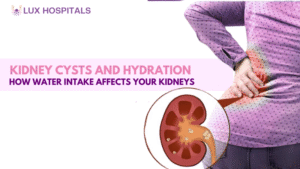Causes of Urinary Retention in Men and Women

Urinary retention is a condition where the bladder does not empty. Urinary retention may be temporary or chronic and result in pain and complications. The causes of urinary retention need to be known to achieve an early diagnosis and treatment. This blog explores the principal causes of urinary retention in men and women, symptoms, and possible treatment.
Understanding Urinary Retention
Urinary retention is when the patient has difficulty urinating with a full bladder. Numerous reasons such as medical conditions, infection, or obstruction can lead to urinary retention. Both male and female patients can feel urinary retention, but the causes will vary depending on gender.
Types of Urinary Retention
- Acute Urinary Retention – Acute urinary incontinence with pain and discomfort.
- Chronic Urinary Retention – Progressive loss of bladder function that leads to incomplete emptying over some time.
Urinary Retention Causes in Women and Men
There are a variety of causes of urinary retention in women and men. These range from physical obstruction to neurologic disease and infection.
1. Obstruction in the Urinary Tract
Obstruction is the most frequent cause of urinary retention. If the urine cannot flow freely through the urinary tract, it cannot pass.
In men: The most frequent cause of urine obstruction that male patients have is an enlarged prostate (Benign Prostatic Hyperplasia – BPH). The prostate gland encircles the urethra, which can block the flow of urine if enlarged.
In women: Conditions of urinary retention in women can be pelvic organ prolapse, when the bladder or uterus sags down and compresses against the urethra
2. Neurological Disorders
Nerve injury that regulates bladder function can cause difficulty in urination. Some nervous system diseases are:
- Multiple sclerosis
- Stroke
- Spinal cord injury
- Parkinson’s disease
3. Urinary Tract Infections (UTIs)
Urinary tract infection may result in bladder or urethra inflammation and swelling, resulting in urinary retention symptoms. Burning, frequent urination, and incomplete bladder emptying are some of the symptoms.
4. Medications
Some medications affect the bladder and result in not being able to pass urine. Some medications that may cause urinary retention include:
- Antidepressants
- Antihistamines
- Muscle relaxants
- Decongestants
5. Weak Bladder Muscles
With increased age, the bladder muscles lose strength and the bladder fails to empty completely. This can cause urinary retention and frequent urination.
6. Surgery and Anesthesia
Short-term urinary retention may occur after surgery, especially spinal and abdominal surgery, due to the effect of anesthetics and painkillers.
7. Bladder Stones and Tumors
Bladder tumors and bladder stones may occlude the urinary tract, and this causes urinary retention. They occur in patients with a background of chronic infection or irritation of the bladder.
Symptoms of Urinary Retention
Symptoms of urinary retention differ by severity and cause. Some common symptoms include:
- Difficulty urinating or a weak stream
- Frequent urination symptoms, particularly nighttime
- Sense of incomplete bladder emptying
- Lower abdominal pain and discomfort
- Leakage of urine due to overflow incontinence
Diagnosis of Urinary Retention
Urinary retention can be diagnosed by a health professional by:
- Physical Examination: To determine if there is an enlarged prostate in men or pelvic organ prolapse in women.
- Bladder Ultrasound: To determine the amount of urine still in the bladder.
- Urine Tests: To check for infections or other issues.
- Cystoscopy: To investigate blockages within the bladder and urethra.
Treatment of Urinary Retention
Treatment varies according to the reason for urinary retention and may include:
1. Medications
- Alpha-blockers to relieve prostate muscles in men
- Antibiotics in case of infection
- Relaxation drugs for bladder muscles and increased flow of urine
2. Catheterization
A catheter is introduced to drain urine when the bladder cannot drain spontaneously.
3. Surgery
- Operation in male patients with urine obstruction caused by BPH
- Repair of prolapse of pelvic organs in women
- Removal of tumor or stone in the bladder
4. Life Changes
- Increased fluid intake to avoid infection and bladder stone
- Conformist pelvic floor exercises for bladder muscle strengthening
- Avoidance of urinary retention potentiating drugs (on doctor’s advice)
When to Consult a Doctor
When you are having trouble urinating, hurting, or other urinary retention symptoms, consult a doctor. Delayed treatment can result in serious complications like kidney damage or infection.
Conclusion
Urinary retention is a serious disorder that could affect men and women differently. Identification of the principal causes of urinary retention is vital for the treatment to be successful. If you have frequent urination, difficulty urinating, or any other urine problem, seek the advice of a physician. Identifying the causes of urinary retention in women and men would ensure the disorder is treated and avoided successfully.
Frequently Asked Questions
Urinary retention can be caused by an enlarged prostate, urinary tract infection, nerve damage, bladder stones, tumor, some medications, and weak bladder muscles.
Symptoms are a hard time urinating, weak stream, frequent urination, sense of not being able to empty the bladder fully, and pain in the abdomen.
Mild ones are treatable by lifestyle modification and pelvic floor exercises, but the severe ones need to be treated medically, for instance, with medication, catheterization, or surgery.
Yes, if untreated, it can cause complications like damage to the kidney, urinary tract infection, and bladder dysfunction.
Seek immediate medical care, as acute urinary retention can be painful and may need catheterization or urgent treatment.
Yes, men are more likely to develop prostate enlargement, while women develop it secondary to pelvic organ prolapse or issues with childbirth.




















